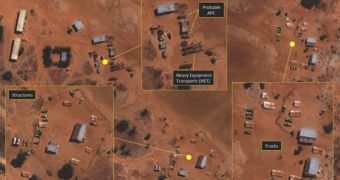A new project initiated by activist and A-lister George Clooney seeks to ensure that mass atrocities no longer take place in some of the poorest and most unstable regions on Earth, such as Sudan.
The new approach, called the Satellite Sentinel Project (SSP), relies on the use of unique satellite observations, and of Google Map Maker technologies to promote safety in dangerous areas.
The early-warning system can give those in charge of surveying a certain area the ability to exert rapid responses whenever human rights and human security are threatened on the ground. A commercial satellite is the main pawn in this operation.
According to political analysts, the southern and northern parts of Sudan have been locked in a deadly civil war, which already claimed the lives of two million people. The SSP is being focused at the border between the two halves of the country.
This is done because many analysts believe that South's wish to secede, and its clear commitment to doing so (more than 99 percent of people voted for it this January) will spur new conflicts.
It is not uncommon among African nations that conflicts are extremely bloody, and that they also feature large numbers of atrocities. The goal of the SSP is to prevent the next big genocide from taking place, Space reports.
The Project includes organizations such as Not On Our Watch, Google, the Enough Project, the United Nations UNITAR Operational Satellite Applications Program (UNOSAT), the Harvard Humanitarian Initiative, Trellon LLC., and, oddly enough, MTV.
“War criminals thrive in the dark. It’s a lot harder to commit mass atrocities in the glare of the media spotlight,” George Clooney explained in a statement regarding the SSP.
“I think this is an extremely interesting project on many levels – technologically, politically and academically,” explains Harvard University investigator David Yanagizawa-Drott.
“Since there has never been anything like this before, at least of this scope and level, there is also very limited knowledge about what role these types of systems can play,” he goes on to say.
“As the situation in Sudan unfolds, I expect us to learn a lot in the next few months,” adds Yanagizawa-Drott, who is the director of systemwide research and evaluation at Harvard.
But not everyone is convinced that the new approach will work, given the track-record this surveillance method had in the past. The director of public policy organization GlobalSecurity.org, John Pike, is among them.
“We got interested in using satellites for averting humanitarian catastrophes, or 'genocide prevention,' back in the early 1990s,” he explains, adding that no campaign at the time, or since, managed to capture the attention of the people to they extent they should have had.
“I think the necessary conditions of a distinctive and readily apparent signature in an otherwise unpublicized event are unlikely to be met in this case,” the expert reveals.
“This project has already gotten most of the public visibility it will receive. I wish it were otherwise, but there are many things I wish were otherwise,” he concludes.

 14 DAY TRIAL //
14 DAY TRIAL //